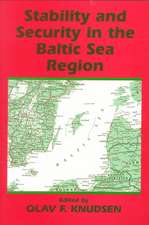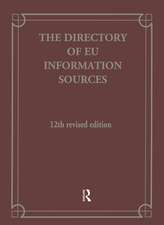NGOs and Global Trade: Non-state voices in EU trade policymaking: Global Institutions
Autor Erin Hannahen Limba Engleză Hardback – 11 feb 2016
Hannah advances a constructivist account of the role of NGOs in the EU’s trade policymaking process. She argues that NGOs have been instrumental in providing education, raising awareness, and giving a voice to broader societal concerns about proposed trade deals, both when they take advantage of formal participatory opportunities and when they protest from the streets and in the media. However, the book also highlights how NGO inputs are mediated by the social structure of global trade governance. Epistemes—the background knowledge, ideological and normative beliefs, and shared assumptions about how the world works—determine who has a voice in global trade governance.
Showing how NGOs succeed only when their advocacy conforms broadly to the dominant episteme, this book will be of value to scholars and students with an interest in NGOs and international trade negotiations. It will also be of interest to policymakers, national trade negotiators, government departments, and the trade policy community.
| Toate formatele și edițiile | Preț | Express |
|---|---|---|
| Paperback (1) | 449.41 lei 6-8 săpt. | |
| Taylor & Francis – 12 ian 2018 | 449.41 lei 6-8 săpt. | |
| Hardback (1) | 1049.19 lei 6-8 săpt. | |
| Taylor & Francis – 11 feb 2016 | 1049.19 lei 6-8 săpt. |
Din seria Global Institutions
-
 Preț: 286.42 lei
Preț: 286.42 lei -
 Preț: 329.60 lei
Preț: 329.60 lei -
 Preț: 303.16 lei
Preț: 303.16 lei -
 Preț: 279.80 lei
Preț: 279.80 lei -
 Preț: 279.88 lei
Preț: 279.88 lei -
 Preț: 309.04 lei
Preț: 309.04 lei -
 Preț: 326.01 lei
Preț: 326.01 lei -
 Preț: 271.46 lei
Preț: 271.46 lei -
 Preț: 310.65 lei
Preț: 310.65 lei -
 Preț: 301.39 lei
Preț: 301.39 lei -
 Preț: 295.35 lei
Preț: 295.35 lei -
 Preț: 365.03 lei
Preț: 365.03 lei -
 Preț: 299.26 lei
Preț: 299.26 lei -
 Preț: 326.36 lei
Preț: 326.36 lei -
 Preț: 356.45 lei
Preț: 356.45 lei -
 Preț: 188.79 lei
Preț: 188.79 lei -
 Preț: 345.89 lei
Preț: 345.89 lei -
 Preț: 363.25 lei
Preț: 363.25 lei -
 Preț: 363.20 lei
Preț: 363.20 lei - 18%
 Preț: 1001.55 lei
Preț: 1001.55 lei - 26%
 Preț: 761.76 lei
Preț: 761.76 lei - 18%
 Preț: 999.82 lei
Preț: 999.82 lei -
 Preț: 447.90 lei
Preț: 447.90 lei -
 Preț: 384.16 lei
Preț: 384.16 lei -
 Preț: 440.69 lei
Preț: 440.69 lei -
 Preț: 369.18 lei
Preț: 369.18 lei -
 Preț: 368.90 lei
Preț: 368.90 lei -
 Preț: 345.89 lei
Preț: 345.89 lei -
 Preț: 360.10 lei
Preț: 360.10 lei - 18%
 Preț: 998.71 lei
Preț: 998.71 lei - 18%
 Preț: 1113.25 lei
Preț: 1113.25 lei -
 Preț: 358.84 lei
Preț: 358.84 lei - 17%
 Preț: 246.93 lei
Preț: 246.93 lei - 18%
 Preț: 1160.47 lei
Preț: 1160.47 lei - 18%
 Preț: 1052.38 lei
Preț: 1052.38 lei -
 Preț: 381.03 lei
Preț: 381.03 lei -
 Preț: 364.51 lei
Preț: 364.51 lei - 26%
 Preț: 819.48 lei
Preț: 819.48 lei - 18%
 Preț: 1111.51 lei
Preț: 1111.51 lei - 18%
 Preț: 999.46 lei
Preț: 999.46 lei
Preț: 1049.19 lei
Preț vechi: 1279.50 lei
-18% Nou
Puncte Express: 1574
Preț estimativ în valută:
200.77€ • 210.14$ • 167.10£
200.77€ • 210.14$ • 167.10£
Carte tipărită la comandă
Livrare economică 31 martie-14 aprilie
Preluare comenzi: 021 569.72.76
Specificații
ISBN-13: 9780415712637
ISBN-10: 0415712637
Pagini: 170
Ilustrații: 3 black & white illustrations, 3 black & white halftones
Dimensiuni: 138 x 216 x 11 mm
Greutate: 0.29 kg
Ediția:New.
Editura: Taylor & Francis
Colecția Routledge
Seria Global Institutions
Locul publicării:Oxford, United Kingdom
ISBN-10: 0415712637
Pagini: 170
Ilustrații: 3 black & white illustrations, 3 black & white halftones
Dimensiuni: 138 x 216 x 11 mm
Greutate: 0.29 kg
Ediția:New.
Editura: Taylor & Francis
Colecția Routledge
Seria Global Institutions
Locul publicării:Oxford, United Kingdom
Public țintă
Postgraduate and UndergraduateCuprins
Introduction. 1. Contesting cosmopolitan Europe 2. The evolution of EU trade politics—agency, competency, and decision-making processes 3. Prescription for influence? NGOs and the EU’s TRIPS and access to medicines negotiations 4. Too thirsty to keep fighting? NGOs and the EU’s quest for water services liberalization 5. Where to from here?
Recenzii
This is an outstanding book, one of the clearest analyses of NGOs trying to influence the current world of multilevel governance. It is must reading for any student of the global trade system, the EU, and global governance in general.' - Craig Murphy, Department of Conflict Resolution, Human Security, and Global Governance, The University of Massachusetts Boston, USA
‘Erin Hannah sheds much light on the complex role of non-governmental organizations in promoting progressive policies across integrating markets. Based on extensive research inside contemporary Europe, her accessible analysis highlights the limits of the most ambitious advocacy strategies. Pushing those limits remains possible, but success depends upon subtlety, persistence, and patience. NGO leaders, and anyone interested in their important work, should read this splendid book.’ - Louis W. Pauly, Professor of Political Science, University of Toronto, Canada
'This important book reaches a dismal conclusion – wildly successful NGO campaigning in the EU has only marginally impacted on trade policy. But, it is not a counsel of despair – potential routes out of this global epistemic logjam are identified and elaborated. Essential reading for anyone interested in understanding the contemporary limits to NGO campaigning.' - David Hulme, Professor of Development Studies, University of Manchester, UK
This is an outstanding book, one of the clearest analyses of NGOs trying to influence the current world of multilevel governance. It is must reading for any student of the global trade system, the EU, and global governance in general.' - Craig Murphy, Department of Conflict Resolution, Human Security, and Global Governance, The University of Massachusetts Boston, USA
‘Erin Hannah sheds much light on the complex role of non-governmental organizations in promoting progressive policies across integrating markets. Based on extensive research inside contemporary Europe, her accessible analysis highlights the limits of the most ambitious advocacy strategies. Pushing those limits remains possible, but success depends upon subtlety, persistence, and patience. NGO leaders, and anyone interested in their important work, should read this splendid book.’ - Louis W. Pauly, Professor of Political Science, University of Toronto, Canada
'This important book reaches a dismal conclusion – wildly successful NGO campaigning in the EU has only marginally impacted on trade policy. But, it is not a counsel of despair – potential routes out of this global epistemic logjam are identified and elaborated. Essential reading for anyone interested in understanding the contemporary limits to NGO campaigning.' - David Hulme, Professor of Development Studies, University of Manchester, UK
'NGOs and Global Trade powerfully challenges assumptions that 'civil society' always paves the way to a more equitable global economy. Yet out of this sobering analysis also come pointers for more progressive trade politics in the future.' - Jan Aart Scholte, Professor in the School of Global Studies, University of Gothenburg, Sweden
'The case studies are empirically rich and well conducted. They are also surprisingly readable, given the technical complexity of the trade negotiations that the author relates.' - Anna Khakee, University of Malta, Global Affairs
‘Erin Hannah sheds much light on the complex role of non-governmental organizations in promoting progressive policies across integrating markets. Based on extensive research inside contemporary Europe, her accessible analysis highlights the limits of the most ambitious advocacy strategies. Pushing those limits remains possible, but success depends upon subtlety, persistence, and patience. NGO leaders, and anyone interested in their important work, should read this splendid book.’ - Louis W. Pauly, Professor of Political Science, University of Toronto, Canada
'This important book reaches a dismal conclusion – wildly successful NGO campaigning in the EU has only marginally impacted on trade policy. But, it is not a counsel of despair – potential routes out of this global epistemic logjam are identified and elaborated. Essential reading for anyone interested in understanding the contemporary limits to NGO campaigning.' - David Hulme, Professor of Development Studies, University of Manchester, UK
This is an outstanding book, one of the clearest analyses of NGOs trying to influence the current world of multilevel governance. It is must reading for any student of the global trade system, the EU, and global governance in general.' - Craig Murphy, Department of Conflict Resolution, Human Security, and Global Governance, The University of Massachusetts Boston, USA
‘Erin Hannah sheds much light on the complex role of non-governmental organizations in promoting progressive policies across integrating markets. Based on extensive research inside contemporary Europe, her accessible analysis highlights the limits of the most ambitious advocacy strategies. Pushing those limits remains possible, but success depends upon subtlety, persistence, and patience. NGO leaders, and anyone interested in their important work, should read this splendid book.’ - Louis W. Pauly, Professor of Political Science, University of Toronto, Canada
'This important book reaches a dismal conclusion – wildly successful NGO campaigning in the EU has only marginally impacted on trade policy. But, it is not a counsel of despair – potential routes out of this global epistemic logjam are identified and elaborated. Essential reading for anyone interested in understanding the contemporary limits to NGO campaigning.' - David Hulme, Professor of Development Studies, University of Manchester, UK
'NGOs and Global Trade powerfully challenges assumptions that 'civil society' always paves the way to a more equitable global economy. Yet out of this sobering analysis also come pointers for more progressive trade politics in the future.' - Jan Aart Scholte, Professor in the School of Global Studies, University of Gothenburg, Sweden
'The case studies are empirically rich and well conducted. They are also surprisingly readable, given the technical complexity of the trade negotiations that the author relates.' - Anna Khakee, University of Malta, Global Affairs
Descriere
The book builds upon the insights of constructivism to advance an alternative account of the role of NGOs in the EU’s trade policymaking process, suggesting that NGOs have succeeded only when their attempts to achieve more democratic, sustainable and equitable trade policies have conformed broadly to the dominant episteme.























